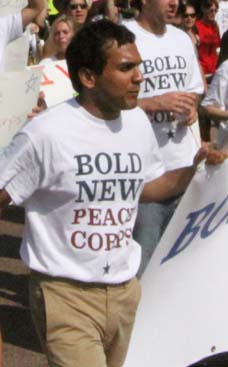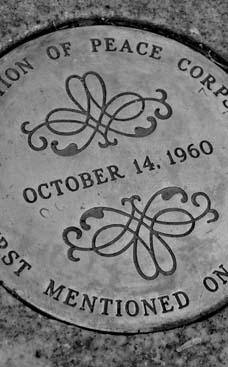
"I miss the people and the warmth of human contact. I miss sitting for hours outdoors on a Shiraz afternoon talking, drinking tea, eating fruit, and playing cards or backgammon. I miss my students and their wonderful curiosity and creativity. I miss the kharboozeh of Mashhad and Hamadan on a hot summer day. I miss the matrons of Shiraz coming door to door to arrange a marriage for their sons or nephews. The best deal is the one arrived at through dialogue, not one that humiliates one side. In other words, we need to talk, not as friends, but as persons who have common concerns. They are not going away; neither are we. What needs to happen is for both sides to ask themselves, "What is in our interests and how do I achieve it?" rather than, "How can I impose my will on the other side?" People have been asking the second question for thirty years and the results have been continuing futility and frustration."
John Limbert has authored three books: Iran: At War with History, Shiraz in the Age of Hafez and, most recently, Negotiating with Iran (2009)
nterview with Ambassador John Limbert: "I Miss the People and their Warmth"
By Fariba Amini, Rooz Online
Ambassador John Limbert has authored three books: Iran: At War with History, Shiraz in the Age of Hafez and, most recently, Negotiating with Iran (2009).
Negotiating with Iran: Wrestling the Ghosts of History
John Limbert lived in Iran in the 1960's as a Peace Corps volunteer and afterwards held various diplomatic posts including Ambassador to Mauritania. John was also one of the hostages held for 444 days at the U.S. Embassy in Tehran in the 1980s. Asked about his experience as a hostage, he said, "I think I got a new appreciation for our own profession -- that is, the profession of diplomacy. And the idea of how do you solve problems between nations and between people."
Appointed by President Obama in 2009, John Limbert became the senior official at the State Department on Iran. He currently teaches at the U.S. Naval Academy in Annapolis, Maryland.
In his latest book John writes: "The reality is that Iranians have almost never been able to choose their political system. Instead, they have tolerated and survived governments whose only functions were to collect taxes and take sons for the military."
Here are the excerpts of an interview Rooz had with John Limbert.
Rooz: You were among a number of diplomats who encouraged the Obama administration to reinvigorate diplomacy with Iran during the talks in Istanbul. The talks soon broke down, however, ending in the usual impasse. Why is it that Iran and the West cannot come to a compromise on this issue? What or who is responsible?
John Limbert: By all reports, the Istanbul talks did not make much progress. It is possible that the semi-public format of these meetings is not helpful. It is pushing the sides into posturing and taking maximalist positions for the sake of domestic politics. It appears that progress on the nuclear front is blocked and the Aliqapu (the main gate) is closed. In that case, we need to look for what the Hungarians call the kiskapu, the small gate or loophole. Doing so may mean changing the format and shifting our focus away from the nuclear program.
Rooz: In your book, "Negotiating with Iran," you note that the media, with their 30-year second analysis, tend to portray Iran as a xenophobic nation, that they like martyrdom, and so forth. Wouldn't you say that some of it is in fact true at least for a part of the population?
Limbert: There is a grain of truth in the sense that some Iranians are xenophobic and some welcome martyrdom. But one can make the same generalizations about any people. There are xenophobic Americans and racist Turks, for example. The real question is "so what?" I would say that such factors - even if partly true -- are NOT going to be the main influence that shapes actions in negotiation.
Rooz: What would be the best deal for Iran and for the U.S.?
Limbert: The best deal is the one arrived at through dialogue, not one that humiliates one side. In other words, we need to talk, not as friends, but as persons who have common concerns. They are not going away; neither are we. What needs to happen is for both sides to ask themselves, "What is in our interests and how do I achieve it?" rather than, "How can I impose my will on the other side?" People have been asking the second question for thirty years and the results have been continuing futility and frustration.
Rooz: You also say in Negotiating with Iran, one should pay attention to BATNA. Can you elaborate on this? What do you mean?
Limbert: BATNA is Best Alternative to a Negotiated Agreement. In other words, what do we (and they) get if there is no deal? In a negotiation, both sides have to see an agreement as being better than no agreement. As I said in my book, "what works in any negotiation-being prepared, building relationships, exercising patience, knowing both one's own and the other side's BATNA, understanding the other side's real interests- will work in negotiations with the Islamic Republic."
Rooz: During the last month, close to 45 people (other reports put the number at 55) have been executed in Iran on various grounds. A number of women activists, lawyers, university professors, and liberal/religious thinkers have been arrested; why do you think the Islamic Republic of Iran is launching such a vicious attack on Iran's civil society?
Limbert: I do not know why the authorities in Tehran do what they do. I do agree that they appear to have declared war against a segment of their own population. But the relations between the IRI and the intelligentsia have been difficult since the earliest days of the revolution. All of the people you mention ask inconvenient questions.
Rooz: You were a hostage for 444 days; do you have any resentment towards those who kept you? I remember you said once that they should apologize to the people of Iran and not to me which is very honorable. Would you meet with any of them?
Limbert: I have no problem meeting with any of them privately. I have no particular resentment against them. At the time they were young and emotional engineering students. If I blame anyone, I blame the opportunistic politicians who did not take responsibility but rode this particular wave of emotion and fury.
Rooz: It is claimed that Ahmadinejad was one of the hostage takers. Is that true? Can you, as one of the former hostages, say whether this is accurate or not?
Limbert: I do not believe that he was. He was among the students (from the engineering school) who originally planned the take-over of embassies but he, as I have heard from different sources, was against the take-over of the U.S. Embassy. He had indicated that the left was more dangerous; therefore the Soviet embassy should be targeted. As we saw, the left came under direct attack a bit later.
Rooz: You lived in Shiraz for many years and taught in the schools of Kurdistan; what do you miss about Iran?
Limbert: I miss the people and the warmth of human contact. I miss sitting for hours outdoors on a Shiraz afternoon talking, drinking tea, eating fruit, and playing cards or backgammon. I miss my students and their wonderful curiosity and creativity. I miss the kharboozeh of Mashhad and Hamadan on a hot summer day. I miss the matrons of Shiraz coming door to door to arrange a marriage for their sons or nephews.















